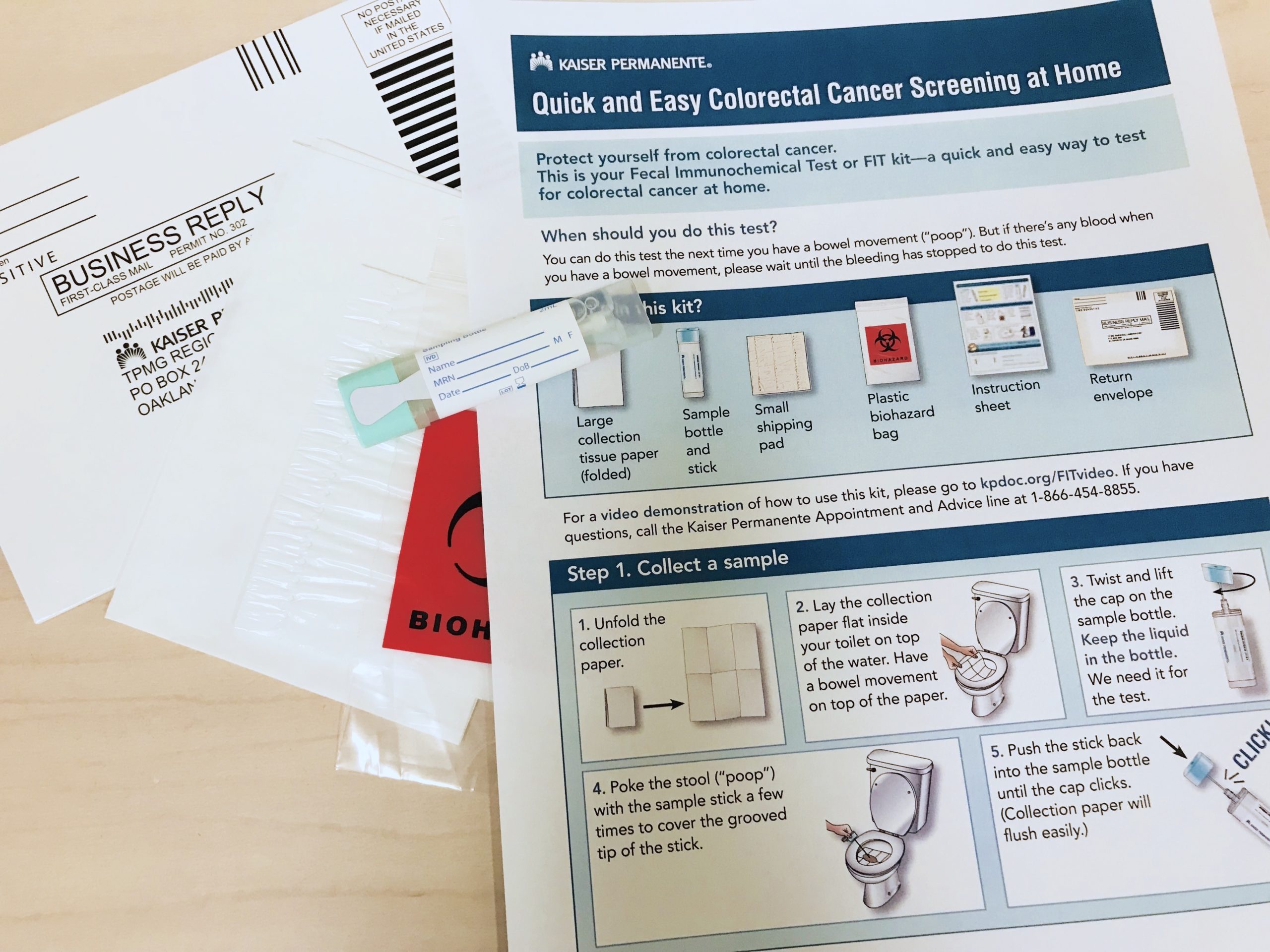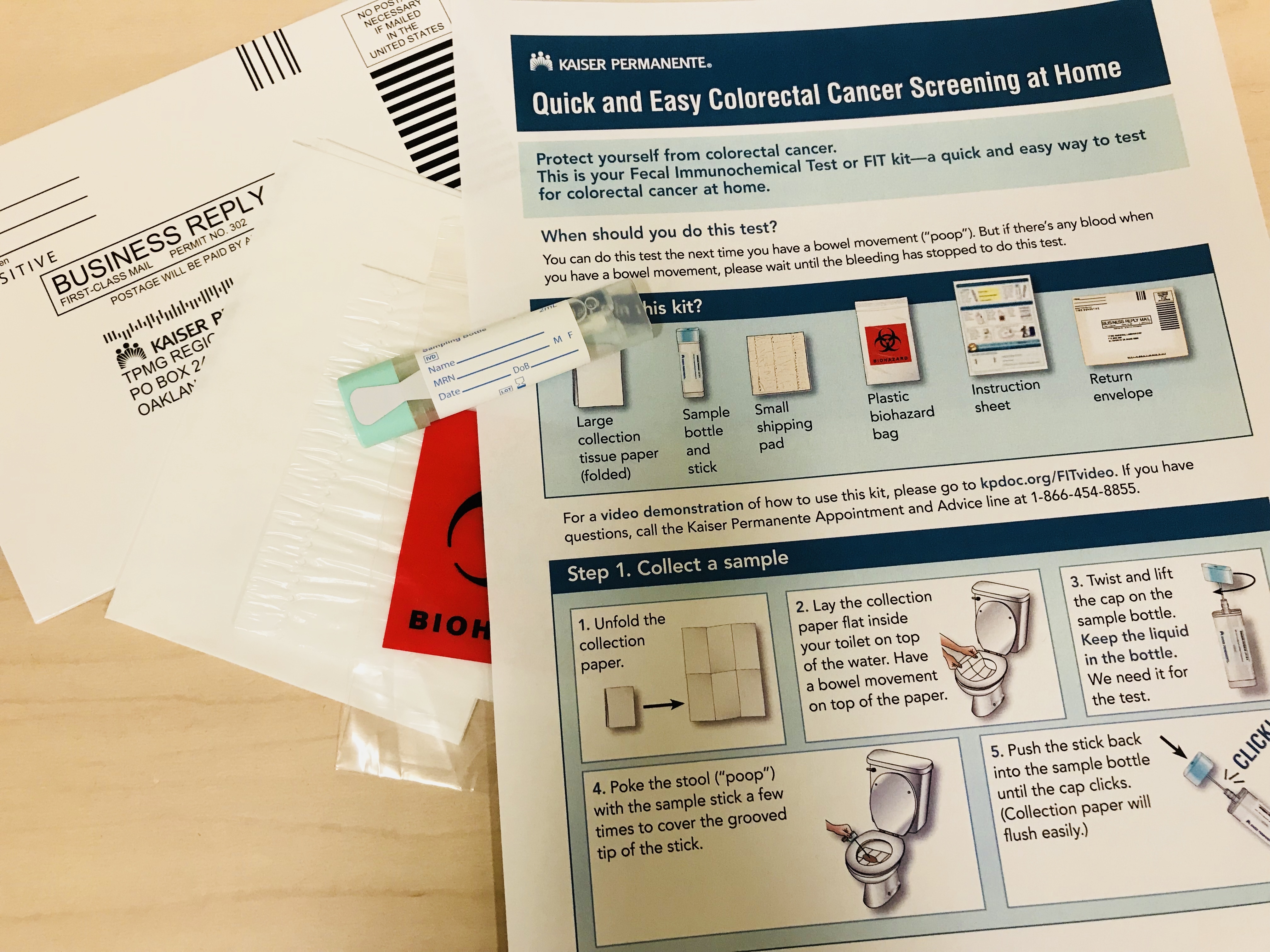Crossing the Quality Chasm for Men under age 55 (CQC55)
The goal of this research is to improve hypertension control, diabetes control, and colorectal cancer screening rates among younger men within KPNC. We will start by conducting focus groups with Black, Filipino, and Latino men aged 40-55 to identify barriers…
Impact of a scalable training program on the quality of colonoscopy performance and risk of post-colonoscopy colorectal cancer
Endoscopist adenoma detection rates (ADRs) vary widely and are associated with patients' risk of postcolonoscopy colorectal cancers (PCCRCs). However, few scalable physician-directed interventions demonstrably both improve ADR and reduce PCCRC risk. Among patients undergoing colonoscopy, we evaluated the influence of…
An efficient strategy for evaluating new non-invasive screening tests for colorectal cancer: the guiding principles
New screening tests for colorectal cancer (CRC) are rapidly emerging. Conducting trials with mortality reduction as the end point supporting their adoption is challenging. We re-examined the principles underlying evaluation of new non-invasive tests in view of technological developments and…
Risk of colorectal cancer and colorectal cancer mortality beginning one year after a negative fecal occult blood test, among screen-eligible 76-85-year-olds
Colorectal cancer (CRC) screening is universally recommended for adults ages 45-75 years. Noninvasive fecal occult blood tests are effective screening tests recommended by guidelines. However, empirical evidence to inform older adults' decisions about whether to continue screening is sparse, especially…
Kaiser Permanente research included in national clinical oncology conference
A Randomized, Double-Blind, Placebo-Controlled, Phase 3 Trial of the Efficacy, Safety, and Tolerability of a Single Oral Administration of CP101 for the Prevention of Recurrent Clostridioides difficile Infection (PRISM4)
Phase 3 trial will evaluate the efficacy of CP101 treatment relative to placebo in adults with previously treated recurrent Clostridioides difficile infection (CDI) and evaluate the safety and tolerability of CP101 treatment compared to placebo in adults with previously treated…
Risk of colorectal cancer and colorectal cancer mortality beginning ten years after a negative colonoscopy, among screen-eligible adults 76-85 years old
Few empirical data are available to inform older adults' decisions about whether to screen or continue screening for colorectal cancer based on their prior history of screening, particularly among individuals with a prior negative exam. Using a retrospective cohort of…
Impact and recovery from COVID-19-related disruptions in colorectal cancer screening and care in the US: A scenario analysis
Many colorectal cancer-related procedures were suspended during the COVID-19 pandemic. In this study, we predict the impact of resulting delays in screening (colonoscopy, FIT, and sigmoidoscopy) and diagnosis on colorectal cancer-related outcomes, and compare different recovery scenarios. Using the MISCAN-Colon…
Impact of the COVID-19 pandemic on fecal immunochemical testing, colonoscopy services, and colorectal neoplasia detection in a large United States community-based population
The COVID-19 pandemic has affected clinical services globally, including colorectal cancer (CRC) screening and diagnostic testing. We investigated the pandemic's impact on fecal immunochemical test (FIT) screening, colonoscopy utilization, and colorectal neoplasia detection across 21 medical centers in a large…
5 Questions for… Theodore R. “T. R.” Levin
Current and future colorectal cancer screening strategies
Despite strong evidence of effectiveness, colorectal cancer (CRC) screening remains underused. Currently, there are several options for CRC screening, each with its own performance characteristics and considerations for practice. This Review aims to cover current CRC screening guidelines and highlight…
Colorectal cancer screening program erases disparities in outcomes
Comparative Effectiveness Trial of Non-invasive vs. Invasive Strategies (FIT vs Colonoscopy) for Older Adults with a History of Pre-neoplastic Colon Polyps
This comparative effectiveness trial will evaluate detection of significant neoplasia between the strategies of low threshold annual FIT vs. colonoscopy for older adults with a history of colon polyps. We will investigate whether the FIT strategy is non-inferior to colonoscopy…
Program components and results from an organized colorectal cancer screening program using annual fecal immunochemical testing
Programmatic colorectal cancer (CRC) screening increases uptake, but the design and resources utilized for such models are not well known. We characterized program components and participation at each step in a large program that used mailed fecal immunochemical testing (FIT)…
Kaiser Permanente researcher will co-lead $32.7 million colorectal cancer screening study
Risk stratification for colorectal cancer in individuals with subtypes of serrated polyps
The longitudinal risk of colorectal cancer (CRC) associated with subtypes of serrated polyps (SPs) remains incompletely understood. This community-based, case-control study included 317 178 Kaiser Permanente Northern California members who underwent their first colonoscopy during 2006-2016. Nested within this population,…
Evaluating Acceptance and Screening Yield for Early Colorectal Cancer Screening: (EASY Early CRC)
Three national guideline groups now recommend that all adults start colorectal cancer (CRC) screening at age 45. Before 2018, some guideline groups only recommended African Americans begin CRC screening at age 45. There is currently no empirical evidence of the…
The effect of using fecal testing after a negative sigmoidoscopy on the risk of death from colorectal cancer
To examine whether receiving a fecal occult blood test after a negative sigmoidoscopy reduced mortality from colorectal cancer. We used a nested case-control design with incidence-density matching in historical cohorts of 1,877,740 50-90-year-old persons during 2006-2012, in an integrated health-system…
PREEMPT CRC: Prevention of Colorectal Cancer Through Multiomics Blood Testing
The primary objectives of this study are to determine the sensitivity and specificity of Freenome's test for colorectal adenocarcinoma, using screening CS with histopathology as the reference method.
Heterogeneity in colorectal cancer incidence among people recommended 3-yearly surveillance post-polypectomy: a validation study
Colonoscopy surveillance is recommended for patients at increased risk of colorectal cancer (CRC) following adenoma removal. Low-, intermediate-, and high-risk groups are defined by baseline adenoma characteristics. We previously examined intermediate-risk patients from hospital data and identified a higher-risk subgroup…
Non-alcoholic Fatty Liver Disease Prevalence and Associated Mortality (NAFLD PAM)
This study will investigate the incremental yield of using radiology imaging report information to diagnose non-alcoholic fatty liver disease (NAFLD) compared to International Classification of Disease, Ninth/Tenth Revision, Clinical Modification diagnoses alone in adult Kaiser Permanente Northern California members between…
Early Screening of African Americans (45-50 Years Old) in a Fecal Immunochemical Test-based Colorectal Cancer Screening Program
Some guidelines recommend starting colorectal cancer (CRC) screening before age 50 years for African Americans, but there are few data on screening uptake and yield in this population. We performed a prospective study of fecal immunochemical test (FIT) screening among…
COVID-19 Pandemic: Impact on Colorectal Cancer Screening and Adenoma Surveillance Outcomes (PICASO)
The goal of this project is to evaluate the impact of the COVID pandemic on colorectal cancer screening and surveillance activities, and the impact on outcomes such as colorectal cancer incidence and stage.
Increased Risk of Colorectal Cancer in Individuals With a History of Serrated Polyps
Serrated polyp (SPs) are precursors to 20% to 30% of cases of colorectal tumors, but patients' long-term risk after removal of SPs is poorly understood. We investigated the risk of colorectal cancer (CRC) in individuals with a history of SPs.…
Early colorectal cancer screening benefits African Americans
Mailed fecal immunochemical test outreach for colorectal cancer screening: Summary of a Centers for Disease Control and Prevention-sponsored summit
Uptake of colorectal cancer screening remains suboptimal. Mailed fecal immunochemical testing (FIT) offers promise for increasing screening rates, but optimal strategies for implementation have not been well synthesized. In June 2019, the Centers for Disease Control and Prevention convened a…
Validation of an Algorithm to Identify Patients at Risk for Colorectal Cancer Based on Laboratory Test and Demographic Data in Diverse, Community-Based Population
Approximately 30%-40% of screening-eligible adults in the United States are not up to date with colorectal cancer (CRC) screening. We aimed to validate a predictive score, generated by a machine learning algorithm with common laboratory test data, to identify patients…
PREDICT PCCC: PREDICTing Post Colonoscopy Colorectal Cancer
We are using post-polypectomy surveillance, an increasingly common indication for colonoscopy in clinical practice at TPMG and across the United States, as a model for how we might risk-stratify patients for care. Patients and physicians desire more precise estimates of…
What Is Organized Screening and What Is Its Value?
Most screening in the United States occurs in an opportunistic fashion, although organized screening occurs in some integrated health care systems. Organized colorectal cancer (CRC) screening consists of an explicit screening policy, defined target population, implementation team, health care team…
Long-term Risk of Colorectal Cancer and Related Death After Adenoma Removal in a Large, Community-based Population
The long-term risks of colorectal cancer (CRC) and CRC-related death following adenoma removal are uncertain. Data are needed to inform evidence-based surveillance guidelines, which vary in follow-up recommendations for some polyp types. Using data from a large, community-based integrated health…
Physician researchers seek insights to deliver better care
PRISM-EXT: An Open-Label Extension of CP101 Trials Evaluating Oral Full-Spectrum Microbiota (CP101) in Subjects with Recurrence of Clostridium difficile Infection
This study evaluates the safety and efficacy in reducing recurrence of Clostridium difficile infection in adults who had a recurrence within 8 weeks of receiving CP101 or placebo in PRISM3. Subjects who are experiencing recurrent Clostridium difficile infection will undergo…
Comparison of Universal Versus Age-Restricted Screening of Colorectal Tumors for Lynch Syndrome Using Mismatch Repair Immunohistochemistry: A Cohort Study
Guidelines recommend screening all patients with newly diagnosed colorectal cancer (CRC) for Lynch syndrome (LS). However, the efficiency of universal LS screening in elderly populations has not been well studied. To compare the performance of age-restricted and universal LS screening…
A Multicenter Phase 2 Study of the Efficacy, Safety, and Tolerability of Oral Full-Spectrum Microbiota (CP101) in Subjects with Recurrence of Clostridium Difficile Infection
The objectives of this Phase 2 study are to evaluate the safety and tolerability of CP101 treatment compared to placebo in adults with previously treated, recurrent Clostridium difficile infection, and to evaluate the efficacy of CP101 treatment relative to placebo…
“I Owe My Life to the Test”
Strategies to Improve Follow-up After Positive Fecal Immunochemical Tests in a Community-Based Setting: A Mixed-Methods Study
The effectiveness of fecal immunochemical test (FIT) screening for colorectal cancer depends on timely colonoscopy follow-up of positive tests, although limited data exist regarding effective system-level strategies for improving follow-up rates. Using a mixed-methods design (qualitative and quantitative), we first…
Long-term Risk of Colorectal Cancer and Related Deaths After a Colonoscopy With Normal Findings
Guidelines recommend a 10-year rescreening interval after a colonoscopy with normal findings (negative colonoscopy results), but evidence supporting this recommendation is limited. To examine the long-term risks of colorectal cancer and colorectal cancer deaths after a negative colonoscopy result, in…
Balancing Adherence and Expense: The Cost-Effectiveness of Two-Sample vs One-Sample Fecal Immunochemical Test
Colorectal cancer (CRC) causes more than 50,000 deaths each year in the United States but early detection through screening yields survival gains; those diagnosed with early stage disease have a 5-year survival greater than 90%, compared to 12% for those…
Modifiable Failures in the Colorectal Cancer Screening Process and Their Association with Risk of Death
Colorectal cancer (CRC) deaths occur when patients do not receive screening or have inadequate follow-up of abnormal results or when the screening test fails. We have few data on the contribution of each to CRC-associated deaths or factors associated with these…
Colorectal Cancer Screening Participation Among Asian Americans Overall and Subgroups in an Integrated Health Care Setting with Organized Screening
Screening reduces colorectal cancer deaths, but?
Index colonoscopy-related risk factors for postcolonoscopy colorectal cancers
Postcolonoscopy colorectal cancers (PCCRCs) are defined as those detected ≤10 years after an index colonoscopy negative for cancer, but modifiable risk factors are not well established in large, community-based populations. We evaluated risk factors from the index colonoscopy for PCCRCs diagnosed…
Accurate Identification of Colonoscopy Quality and Polyp Findings Using Natural Language Processing
The aim of this study was to test the ability of a commercially available natural language processing (NLP) tool to accurately extract examination quality-related and large polyp information from colonoscopy reports with varying report formats. Colonoscopy quality reporting often requires…
Influence of Varying Quantitative Fecal Immunochemical Test Positivity Thresholds on Colorectal Cancer Detection: A Community-Based Cohort Study
The fecal immunochemical test (FIT) is commonly used for colorectal cancer (CRC) screening. Despite demographic variations in stool hemoglobin concentrations, few data exist regarding optimal positivity thresholds by age and sex. To identify programmatic (multitest) FIT performance characteristics and optimal…
Effects of Organized Colorectal Cancer Screening on Cancer Incidence and Mortality in a Large, Community-based Population
Little information is available on the effectiveness of organized colorectal cancer (CRC) screening on screening uptake, incidence, and mortality in community-based populations. We contrasted screening rates, age-adjusted annual CRC incidence, and incidence-based mortality rates before (baseline year 2000) and after…
Integrated Colorectal Cancer Screening Program Saves Lives
Division of Research’s Theodore Levin, MD, honored for colorectal cancer screening program
Outreach for Colorectal Cancer Screening in African Americans Aged 45 to 49
This study aims to 1) evaluate uptake of fecal immunochemical testing among African Americans aged 45 to 49 who receive outreach for such testing by mail, 2) examine the yield of screening results, including advanced adenomas and colon cancers, and…
Diagnosis of sessile serrated adenoma after educational training in a large, community-based, integrated healthcare setting
Sessile serrated adenomas (SSAs) are precursors of 15% to 30% of colorectal cancers but are frequently underdiagnosed. We sought to measure the SSA detection rate (SDR) and predictors of SSA detection after educational training for community gastroenterologists and pathologists. Colonoscopy…
Effectiveness of screening colonoscopy in reducing the risk of death from right and left colon cancer: a large community-based study
Screening colonoscopy's effectiveness in reducing colorectal cancer mortality risk in community populations is unclear, particularly for right-colon cancers, leading to recommendations against its use for screening in some countries. This study aimed to determine whether, among average-risk people, receipt of…
A Comparison of Fecal Immunochemical and High-Sensitivity Guaiac Tests for Colorectal Cancer Screening
Annual testing using either a high-sensitivity guaiac fecal occult blood test (HS-gFOBT) or a fecal immunochemical test (FIT) is recommended for screening average-risk people for colorectal cancer. We compared the performance characteristics of the HS-gFOBT Hemoccult II SENSA and two…
Interventions to Improve Follow-up of Positive Results on Fecal Blood Tests: A Systematic Review
Fecal immunochemical testing is the most commonly used method for colorectal cancer screening worldwide. However, its effectiveness is frequently undermined by failure to obtain follow-up colonoscopy after positive test results. To evaluate interventions to improve rates of follow-up colonoscopy for…
Colorectal Cancer Screening Initiation After Age 50 Years in an Organized Program
Recent studies report racial disparities among individuals in organized colorectal cancer (CRC) programs; however, there is a paucity of information on CRC screening utilization by race/ethnicity among newly age-eligible adults in such programs. This was a retrospective cohort study among…
Colorectal Cancer Screening: Recommendations for Physicians and Patients From the U.S. Multi-Society Task Force on Colorectal Cancer
This document updates the colorectal cancer (CRC) screening recommendations of the U.S. Multi-Society Task Force of Colorectal Cancer (MSTF), which represents the American College of Gastroenterology, the American Gastroenterological Association, and The American Society for Gastrointestinal Endoscopy. CRC screening tests…
Colorectal Cancer Screening: Recommendations for Physicians and Patients from the U.S. Multi-Society Task Force on Colorectal Cancer
This document updates the colorectal cancer (CRC) screening recommendations of the U.S. Multi-Society Task Force of Colorectal Cancer (MSTF), which represents the American College of Gastroenterology, the American Gastroenterological Association, and The American Society for Gastrointestinal Endoscopy. CRC screening tests…
Recommendations on Surveillance and Management of Biallelic Mismatch Repair Deficiency (BMMRD) Syndrome: A Consensus Statement by the US Multi-Society Task Force on Colorectal Cancer
The US Multi-Society Task Force on Colorectal Cancer, with invited experts, developed a consensus statement and recommendations to assist health care providers with appropriate management of patients with biallelic mismatch repair deficiency (BMMRD) syndrome, also called constitutional mismatch repair deficiency syndrome. This position…
Recommendations on Surveillance and Management of Biallelic Mismatch Repair Deficiency (BMMRD) Syndrome: A Consensus Statement by the US Multi-Society Task Force on Colorectal Cancer
The US Multi-Society Task Force on Colorectal Cancer, with invited experts, developed a consensus statement and recommendations to assist health care providers with appropriate management of patients with biallelic mismatch repair deficiency (BMMRD) syndrome, also called constitutional mismatch repair deficiency…
For Patients With Positive Fecal Screening Test, Sooner is Better for Follow-Up Colonoscopy
The risk of colorectal cancer increased significantly when colonoscopy was delayed by more than nine months following a positive fecal screening test, according to a large Kaiser Permanente study published today in the Journal of the American Medical Association. “With…
Association Between Time to Colonoscopy After a Positive Fecal Test Result and Risk of Colorectal Cancer and Cancer Stage at Diagnosis
The fecal immunochemical test (FIT) is commonly used for colorectal cancer screening and positive test results require follow-up colonoscopy. However, follow-up intervals vary, which may result in neoplastic progression. To evaluate time to colonoscopy after a positive FIT result and…
Recommendations on Fecal Immunochemical Testing to Screen for Colorectal Neoplasia: A Consensus Statement by the US Multi-Society Task Force on Colorectal Cancer
The use of the fecal occult blood test (FOBT) for colorectal cancer (CRC) screening is supported by randomized trials demonstrating effectiveness in cancer prevention and widely recommended by guidelines for this purpose. The fecal immunochemical test (FIT), as a direct…
Endoscopist Fatigue Estimates and Colonoscopic Adenoma Detection in a Large Community-Based Setting
Endoscopist fatigue may impact colonoscopy quality, but prior studies conflict, and minimal data exist from community-based practices where most colonoscopies are performed. Within a large, community-based integrated healthcare system, we evaluated the associations among 4 measures of endoscopist fatigue and…
Genetic Biomarker Prevalence Is Similar in Fecal Immunochemical Test Positive and Negative Colorectal Cancer Tissue
Fecal immunochemical test (FIT) screening detects most asymptomatic colorectal cancers. Combining FIT screening with stool-based genetic biomarkers increases sensitivity for cancer, but whether DNA biomarkers (biomarkers) differ for cancers detected versus missed by FIT screening has not been evaluated in…
Fecal Immunochemical Test (FIT) for Colon Cancer Screening: Variable Performance with Ambient Temperature
Fecal immunochemical tests (FITs) are widely used in colorectal cancer (CRC) screening, but hemoglobin degradation, due to exposure of the collected sample to high temperatures, could reduce test sensitivity. We examined the relation of ambient temperature exposure with FIT positivity…
Shifts in the fecal microbiota associated with adenomatous polyps
Adenomatous polyps are the most common precursor to colorectal cancer, the second leading cause of cancer-related death in the United States. We sought to learn more about early events of carcinogenesis by investigating shifts in the gut microbiota of patients…
Recommendations on Fecal Immunochemical Testing to Screen for Colorectal Neoplasia: A Consensus Statement by the US Multi-Society Task Force on Colorectal Cancer
The use of the fecal occult blood test (FOBT) for colorectal cancer (CRC) screening is supported by randomized trials demonstrating effectiveness in cancer prevention and widely recommended by guidelines for this purpose. The fecal immunochemical test (FIT), as a direct…
Race/Ethnicity and Adoption of a Population Health Management Approach to Colorectal Cancer Screening in a Community-Based Healthcare System
Screening outreach programs using population health management principles offer services uniformly to all eligible persons, but racial/ethnic colorectal cancer (CRC) screening patterns in such programs are not well known. To examine the association between race/ethnicity and the receipt of CRC…
Consequences of Increasing Time to Colonoscopy Examination Following Positive Result From Fecal Colorectal Cancer Screening Test
Delays in diagnostic testing after a positive result from a screening test can undermine the benefits of colorectal cancer (CRC) screening, but there are few empirical data on the effects of such delays. We used microsimulation modeling to estimate the…
Fecal Immunochemical Test Program Performance Over 4 Rounds of Annual Screening: A Retrospective Cohort Study
The fecal immunochemical test (FIT) is a common method for colorectal cancer (CRC) screening, yet its acceptability and performance over several rounds of annual testing are largely unknown. To assess FIT performance characteristics over 4 rounds of annual screening. Retrospective…
Colonoscopy Surveillance After Colorectal Cancer Resection: Recommendations of the US Multi-Society Task Force on Colorectal Cancer
The US Multi-Society Task Force has developed updated recommendations to guide health care providers with the surveillance of patients after colorectal cancer (CRC) resection with curative intent. This document is based on a critical review of the literature regarding the…
Colonoscopy Surveillance after Colorectal Cancer Resection: Recommendations of the US Multi-Society Task Force on Colorectal Cancer
The US Multi-Society Task Force has developed updated recommendations to guide health care providers with the surveillance of patients after colorectal cancer (CRC) resection with curative intent. This document is based on a critical review of the literature regarding the…
Factors Influencing Variation in Physician Adenoma Detection Rates: a Theory-Based Approach for Performance Improvement
Interventions to improve physician adenoma detection rates for colonoscopy have generally not been successful, and there are little data on the factors contributing to variation that may be appropriate targets for intervention. We sought to identify factors that may influence…
Time to Colonoscopy after Positive Fecal Blood Test in Four U.S. Health Care Systems
To reduce colorectal cancer mortality, positive fecal blood tests must be followed by colonoscopy. We identified 62,384 individuals ages 50 to 89 years with a positive fecal blood test between January 1, 2011 and December 31, 2012 in four health…
Ten-year incidence of colorectal cancer following a negative screening sigmoidoscopy: an update from the Colorectal Cancer Prevention (CoCaP) programme
To examine the rates of colorectal cancer (CRC) following a negative screening sigmoidoscopy. Cohort study. An integrated healthcare delivery organisation in California, USA. 72,483 men and women aged 50?years and above who had a negative screening sigmoidoscopy between 1994 and…
Non-invasive fecal test provides effective screening for colorectal cancer
Adherence to recommended annual screening high among health plan members When used in a large health care system, the fecal immunochemical test (FIT) was sensitive for detecting colorectal cancer and adherence to recommended annual follow-up testing was high,making the non-invasive…
American Cancer Society Honors Kaiser Permanente’s Theodore R. Levin for Leadership in Screening for Colorectal Cancer
The American Cancer Society honored Kaiser Permanente’s Theodore R. Levin, MD, for his leadership in raising the health care system’s screening rates for colorectal cancer to among the highest in the nation, at its 6th annual Jewel Ball on Saturday,…
Public health impact of achieving 80% colorectal cancer screening rates in the United States by 2018
The National Colorectal Cancer Roundtable, a national coalition of public, private, and voluntary organizations, has recently announced an initiative to increase colorectal cancer (CRC) screening rates in the United States to 80% by 2018. The authors evaluated the potential public…
Higher Quality Screening Colonoscopies Associated With Lower Risk of Colorectal Cancer Death, Without Higher Overall Costs
Improving colonoscopy quality through higher detection rates for a particular type of polyp may be associated with as much as a 60 percent lower lifetime risk of colorectal cancer incidence and death without increasing overall care costs, according to a…
Variation in Adenoma Detection Rate and the Lifetime Benefits and Cost of Colorectal Cancer Screening: A Microsimulation Model
Colonoscopy is the most commonly used colorectal cancer screening test in the United States. Its quality, as measured by adenoma detection rates (ADRs), varies widely among physicians, with unknown consequences for the cost and benefits of screening programs. To estimate…
Alcohol as a Vital Sign: We Ask Everyone
By Ann Wallace, Senior Communications Specialist, Kaiser Permanente Division of Research If you’ve paid a visit to your primary care physician in the last 18 months, it’s highly likely that the Medical Assistant (MA) who accompanies you to the exam…
CDC Grand Rounds: the Future of Cancer Screening
Cancer is the second leading cause of death in the United States, with 52% of deaths caused by cancers of the lung and bronchus, female breast, uterine cervix, colon and rectum, oral cavity and pharynx, prostate, and skin (melanoma). In…
Adjusting for Patient Demographics Has Minimal Effects on Rates of Adenoma Detection in a Large, Community-based Setting
Reliable estimates of adenoma detection rates (ADRs) are needed to inform colonoscopy quality standards, yet little is known about the contributions of patient demographics to variation in ADRs. We evaluated the effects of adjusting for patient age, race/ethnicity, and family…
Development and validation of an algorithm for classifying colonoscopy indication
Accurate determination of colonoscopy indication is required for managing clinical programs and performing research; however, existing algorithms that use available electronic databases (eg, diagnostic and procedure codes) have yielded limited accuracy. To develop and validate an algorithm for classifying colonoscopy…
Colorectal cancer deaths attributable to nonuse of screening in the United States
Screening is a major contributor to colorectal cancer (CRC) mortality reductions in the United States but is underused. We estimated the fraction of CRC deaths attributable to nonuse of screening to demonstrate the potential benefits from targeted interventions. The established…
Lack of significant association between serum inflammatory cytokine profiles and the presence of colorectal adenoma
Inflammatory cytokines in the colonic microenvironment have been shown to increase with advance colorectal cancer disease state. However, the contribution of inflammatory cytokines to pre-malignant disease, such as the formation of adenomas, is unclear. Using the Milliplex® MAP Human Cytokine/…
Guidelines on Genetic Evaluation and Management of Lynch Syndrome: A Consensus Statement by the US Multi-Society Task Force on Colorectal Cancer
The Multi-Society Task Force, in collaboration with invited experts, developed guidelines to assist health care providers with the appropriate provision of genetic testing and management of patients at risk for and affected with Lynch syndrome as follows: Figure 1 provides…
Guidelines on Genetic Evaluation and Management of Lynch Syndrome: A Consensus Statement by the US Multi-Society Task Force on Colorectal Cancer
The Multi-Society Task Force, in collaboration with invited experts, developed guidelines to assist health care providers with the appropriate provision of genetic testing and management of patients at risk for and affected with Lynch syndrome as follows: provides a colorectal…
Guidelines on Genetic Evaluation and Management of Lynch Syndrome: A Consensus Statement by the US Multi-Society Task Force on Colorectal Cancer
The Multi-Society Task Force, in collaboration with invited experts, developed guidelines to assist health care providers with the appropriate provision of genetic testing and management of patients at risk for and affected with Lynch syndrome as follows: Figure 1 provides…
The Colorectal Cancer Screening Process in Community Settings: A Conceptual Model for the Population-Based Research Optimizing Screening through Personalized Regimens Consortium
Reducing colorectal cancer mortality by promoting screening has been a national goal for two decades. The NCI's Population-Based Research Optimizing Screening through Personalized Regimens (PROSPR) consortium is the first federal initiative to foster coordinated, transdisciplinary research evaluating the entire cancer…
Leading on Screening for Colorectal Cancer
The fecal immunochemical test, or FIT, that is mailed to member homes. About 137,000 new cases of cancer in the colon or rectum are diagnosed each year in the United States; with 50,000 deaths, it is the third leading cause…
Adenoma detection rate and risk of colorectal cancer and death
The proportion of screening colonoscopic examinations performed by a physician that detect one or more adenomas (the adenoma detection rate) is a recommended quality measure. However, little is known about the association between this rate and patients' risks of a…
Multitarget Stool DNA Testing for Colorectal-Cancer Screening
An accurate, noninvasive test could improve the effectiveness of colorectal-cancer screening. We compared a noninvasive, multitarget stool DNA test with a fecal immunochemical test (FIT) in persons at average risk for colorectal cancer. The DNA test includes quantitative molecular assays…
Accuracy of fecal immunochemical tests for colorectal cancer: systematic review and meta-analysis
Performance characteristics of fecal immunochemical tests (FITs) to screen for colorectal cancer (CRC) have been inconsistent. To synthesize data about the diagnostic accuracy of FITs for CRC and identify factors affecting its performance characteristics. Online databases, including MEDLINE and EMBASE,…
Health Benefits and Cost-Effectiveness of a Hybrid Screening Strategy for Colorectal Cancer
Colorectal cancer (CRC) screening guidelines recommend screening schedules for each single type of test except for concurrent sigmoidoscopy and fecal occult blood test (FOBT). We investigated the cost-effectiveness of a hybrid screening strategy that was based on a fecal immunological…
Effectiveness and Reach of the FLU-FIT Program in an Integrated Health Care System: A Multisite Randomized Trial
OBJECTIVES: We tested the effectiveness of offering home fecal immunochemical tests (FITs) during influenza vaccination clinics to increase colorectal cancer screening (CRCS). METHODS: In a clinical trial at Kaiser Permanente Northern California influenza clinics in Redwood City, Richmond, South San…
DOR advances innovation in colorectal cancer screening
The Kaiser Permanente Division of Research has been an indisputable innovator in the science of screening for colorectal cancer; studies by DOR researchers have contributed to national screenings guidelines while delivering the most effective methods to KP members and the…
Screening colonoscopy and risk for incident late-stage colorectal cancer diagnosis in average-risk adults: a nested case-control study
BACKGROUND: The effectiveness of screening colonoscopy in average-risk adults is uncertain, particularly for right colon cancer. OBJECTIVE: To examine the association between screening colonoscopy and risk for incident late-stage colorectal cancer (CRC). DESIGN: Nested case-control study. SETTING: Four U.S. health…
Sexual transmission of HCV among monogamous heterosexual couples: The HCV partners study
The efficiency of hepatitis C virus (HCV) transmission by sexual activity remains controversial. We conducted a cross-sectional study of HCV-positive subjects and their partners to estimate the risk for HCV infection among monogamous heterosexual couples. A total of 500 anti-HCV-positive,…
Variation of Adenoma Prevalence by Age, Sex, Race, and Colon Location in a Large Population: Implications for Screening and Quality Programs
BACKGROUND & AIMS: Reliable community-based colorectal adenoma prevalence estimates are needed to inform colonoscopy quality standards and to estimate patient colorectal cancer risks; however, minimal data exist from populations with large numbers of diverse patients and examiners. METHODS: We evaluated…
Incidence and Mortality of Colorectal Adenocarcinoma in Persons with Inflammatory Bowel Disease from 1998 to 2010
BACKGROUND & AIMS: The relationship between inflammatory bowel disease (IBD) and the incidence and mortality of colorectal adenocarcinoma (CRC) has not been evaluated recently. METHODS: We calculated the incidence and standardized incidence and mortality rate ratios of CRC among adult…
Automated phone and mail population outreach to promote colorectal cancer screening
OBJECTIVES: To evaluate a population outreach program to promote screening for colorectal cancer (CRC) among average-risk insured men and women. STUDY DESIGN: In 2008, 58,440 Kaiser Permanente Colorado members unscreened for CRC received an interactive voice response (IVR) call followed…
Diagnosis, Comorbidities, and Management of Irritable Bowel Syndrome in Patients in a Large Health Maintenance Organization
BACKGROUND & AIMS: Irritable bowel syndrome (IBS) imposes significant clinical and economic burdens. We aimed to characterize practice patterns for patients with IBS in a large health maintenance organization, analyzing point of diagnosis, testing, comorbidities, and treatment. METHODS: Members of…
Editorial: Taking FIT to the People: Out of the Office and Into the Mail
Colorectal cancer (CRC) screening is most commonly performed in the United States using an opportunistic approach: patients coming to a physician's office for other unrelated reasons are offered screening with either fecal occult blood tests or, more commonly, a referral…
The American Society for Gastrointestinal Endoscopy PIVI (Preservation and Incorporation of Valuable Endoscopic Innovations) on real-time endoscopic assessment of the histology of diminutive colorectal polyps
The PIVI (Preservation and Incorporation of Valuable endoscopic Innovations) initiative is an ASGE program whose objectives are to identify important clinical questions related to endoscopy and to establish a priori diagnostic and/or therapeutic thresholds for endoscopic technologies designed to resolve…
Organized colorectal cancer screening in integrated health care systems
Colorectal cancer (CRC) is an ideal target for early detection and prevention through screening. Noninvasive screening options are the guaiac fecal occult blood test and the fecal immunochemical test. Organized screening offers the promise of uniformly delivering screening to all…
Lack of association between insulin sensitivity and colorectal adenoma risk
Insulin resistance is thought to mediate the association between obesity and colorectal neoplasia, but no prior studies have assessed stimulated insulin sensitivity as a risk factor for colorectal neoplasia. This prospective study examined the association between insulin sensitivity measured directly…
Serial glycosylated hemoglobin levels and risk of colorectal neoplasia among patients with type 2 diabetes mellitus
BACKGROUND: Hyperglycemia may increase the risk of colorectal neoplasia by serving as an energy source for neoplastic growth. We sought to determine whether glycemic control measured by serial hemoglobin A1c (HbA1c) was associated with the risk of colorectal adenoma. METHODS:…
Citalopram provides little or no benefit in nondepressed patients with irritable bowel syndrome
BACKGROUND & AIMS: Data on the benefit of selective serotonin reuptake inhibitors (SSRIs) in irritable bowel syndrome (IBS) are conflicting. The longitudinal relationship between clinical symptoms and sensitivity to barostat-mediated rectal distension in IBS remains unclear. We assessed the benefit…
Editorial: It’s time to make organized colorectal cancer screening convenient and easy for patients
Colorectal cancer (CRC) screening is widely recommended, but underused. To increase screening rates, we need to implement organized and population-based systems to promote CRC screening among people in a single region, health plan, or health system. This is ideally accomplished…
Cigarette smoking and the risk of Barrett’s esophagus
INTRODUCTION: We examined the association between smoking and the risk of Barrett's esophagus (BE), a metaplastic precursor to esophageal adenocarcinoma. METHODS: We conducted a case-control study within the Kaiser Permanente Northern California population. Patients with a new diagnosis of BE…
Alcohol types and sociodemographic characteristics as risk factors for Barrett’s esophagus
BACKGROUND & AIMS: Little is known about the effects of alcohol use and sociodemographics on the risk of Barrett's esophagus, a precursor to esophageal adenocarcinoma. We evaluated the association between alcohol use, alcohol type, sociodemographic profiles, other lifestyle factors, and…
Race, ethnicity, sex and temporal differences in Barrett’s oesophagus diagnosis: a large community-based study, 1994-2006
OBJECTIVE: To evaluate the demographics and incidence of Barrett's oesophagus diagnosis using community-based data. DESIGN: Observational study. SETTING: Kaiser Permanente, Northern California healthcare membership, 1994-2006. PATIENTS: Members with an electronic diagnosis of Barrett's oesophagus. MAIN OUTCOME MEASURES: Incidence and prevalence…
Hemochromatosis gene status as a risk factor for Barrett’s esophagus
Conditions causing high iron levels, such as hemochromatosis, are proposed risk factors for esophageal adenocarcinoma. Although this hypothesis is supported by animal models, no human data currently exist. We conducted a case-control study of persons with a new Barrett's esophagus…
Iron intake and body iron stores as risk factors for Barrett’s esophagus: a community-based study
OBJECTIVE: High iron stores are a proposed modifiable risk factor for esophageal adenocarcinoma, but minimal human data exist. We evaluated whether iron intake and iron stores were associated with Barrett's esophagus, a metaplastic change that is a strong risk factor…
Thiazolidinedione therapy is not associated with increased colonic neoplasia risk in patients with diabetes mellitus
BACKGROUND & AIMS: Thiazolidinedione ligands for peroxisome proliferator-activated receptor gamma (PPARgamma), are used to treat diabetes. PPARgamma is highly expressed in the colon, and exposure to thiazolidinediones has been proposed to affect the risk for colorectal neoplasia. In vitro models…
Stool DNA and occult blood testing for screen detection of colorectal neoplasia
BACKGROUND: Stool DNA testing is a new approach to colorectal cancer detection. Few data are available from the screening setting. OBJECTIVE: To compare stool DNA and fecal blood testing for detection of screen-relevant neoplasia (curable-stage cancer, high-grade dysplasia, or adenomas…
Helicobacter pylori and gastroesophageal reflux disease: a case-control study
BACKGROUND: Gastric colonization with Helicobacter pylori is a proposed protective factor against gastroesophageal reflux disease (GERD), but little population-based data exist and other data conflict. METHODS: We conducted a case-control study within the membership of a large integrated health-care system…
Dietary antioxidants, fruits, and vegetables and the risk of Barrett’s esophagus
OBJECTIVE: The present study evaluated the associations among antioxidants, fruit and vegetable intake, and the risk of Barrett's esophagus (BE), a potential precursor to esophageal adenocarcinoma. METHODS: We conducted a case-control study within the Kaiser Permanente Northern California population. Incident…
Helicobacter pylori infection and the risk of Barrett’s oesophagus: a community-based study
OBJECTIVE: Gastric colonisation with the Helicobacter pylori bacterium is a proposed protective factor against oesophageal adenocarcinoma, but its point of action is unknown. Its associations with Barrett's oesophagus, a metaplastic change that is a probable early event in the carcinogenesis…
Dietary patterns and the risk of Barrett’s esophagus
The objective of this study was to examine the associations between dietary patterns and the risk of Barrett's esophagus, a precursor to esophageal adenocarcinoma. The authors conducted a case-control study within the Kaiser Permanente Northern California population between 2002 and…
Hepatic effects of lovastatin exposure in patients with liver disease: a retrospective cohort study
BACKGROUND: Little is known about the potential adverse hepatic effects of HMG-CoA reductase inhibitors ('statins') in patients with existing liver disease; therefore, we examined the risk of liver toxicity with lovastatin exposure in these patients. METHODS: A retrospective cohort study…
Medical therapy for diabetes is associated with increased use of lower endoscopy
BACKGROUND: Diabetes mellitus is associated with an increased risk of colorectal neoplasia and diabetes medications may further influence the risk. Observational studies of the effect of diabetes medications on colonic neoplasia may be biased if use of diabetes medications is…
Screening for colorectal neoplasms with new fecal occult blood tests: update on performance characteristics
BACKGROUND: One type of fecal occult blood test (FOBT), the unrehydrated guaiac fecal occult blood test (GT), is recommended by the United States Preventive Services Task Force and the Institute of Medicine for use in screening programs, but it has…
Under Used Colon Cancer Screening Test is Effective
And may help improve colon cancer screening rates Oakland CA – An under used colon cancer screening test now available in the U.S. effectively detects colorectal cancer and may help to improve colon cancer screening rates, according to investigators at…
Genetic polymorphisms in one-carbon metabolism: associations with CpG island methylator phenotype (CIMP) in colon cancer and the modifying effects of diet
This study investigated associations between CpG island methylator phenotype (CIMP) colon cancer and genetic polymorphisms relevant to one-carbon metabolism and thus, potentially the provision of methyl groups and risk of colon cancer. Data from a large, population-based case-control study (916…
Dealing with uncertainty: surveillance colonoscopy after polypectomy
Post-polypectomy surveillance is often done sooner than guideline recommendations. This practice is driven by physician intolerance of uncertainty. The accompanying article by Brenner et al. supports the recommendation to wait 5 years or longer following adenoma removal before performing surveillance…
Abdominal obesity and body mass index as risk factors for Barrett’s esophagus
BACKGROUND: Barrett's esophagus is a strong risk factor for esophageal adenocarcinoma, but little is known about its associations with body mass index (BMI) or abdominal obesity. METHODS: We conducted a case-control study within the Kaiser Permanente Northern California population. Persons…
Standardized colonoscopy reporting and data system: report of the Quality Assurance Task Group of the National Colorectal Cancer Roundtable
BACKGROUND: Standardized reporting systems for diagnostic and screening tests facilitate quality improvement programs and clear communication among health care providers. Although colonoscopy is commonly used for screening, diagnosis, and therapy, no standardized reporting system for this procedure currently exists. The…
Change in body size and the risk of colorectal adenomas
Adiposity has been recognized as a risk factor for colorectal adenoma, but the influence of weight gain, adipose tissue distribution, and possible differences between ethnic/racial and gender groups remains unanswered. The aim of this prospective study was to examine the…
Diet and lifestyle factor associations with CpG island methylator phenotype and BRAF mutations in colon cancer
It has been proposed that dietary factors such as folate, alcohol and methionine may be associated with colon cancer because of their involvement in DNA methylation processes. Data from a large population-based case-control study of incident colon cancer were used…
Complications of colonoscopy in an integrated health care delivery system
BACKGROUND: Information about colonoscopy complications, particularly postpolypectomy bleeding, is limited. OBJECTIVE: To quantify the magnitude and severity of colonoscopy complications. DESIGN: Retrospective cohort. SETTING: Kaiser Permanente of Northern California. PATIENTS: 16, 318 members 40 years of age or older undergoing…
Interactions between CYP2C9 and UGT1A6 polymorphisms and nonsteroidal anti-inflammatory drugs in colorectal cancer prevention
BACKGROUND AND AIMS: Variant genotypes of uridine diphosphate glucuronsyltransferase isoenzyme 1A6 (UGT1A6) associated with decreased metabolic activity have been associated with an enhanced protective effect of aspirin on the development of colorectal adenomas. However, interactions between UGT1A6 variants or variants…
Guidelines for colonoscopy surveillance after cancer resection: a consensus update by the American Cancer Society and the US Multi-Society Task Force on Colorectal Cancer
Patients with resected colorectal cancer are at risk for recurrent cancer and metachronous neoplasms in the colon. This joint update of guidelines by the American Cancer Society and the US Multi-Society Task Force on Colorectal Cancer addresses only the use…
Barrett’s esophagus and medications that relax the lower esophageal sphincter
OBJECTIVES: Medications that may increase gastroesophageal reflux could be risk factors for esophageal adenocarcinoma; however, epidemiologic studies present conflicting results. We evaluated patients with a high-risk condition, Barrett's esophagus, to identify risk factors that may act early in the carcinogenic…
Guidelines for colonoscopy surveillance after polypectomy: a consensus update by the US Multi-Society Task Force on Colorectal Cancer and the American Cancer Society
Adenomatous polyps are the most common neoplastic findings uncovered in people who undergo colorectal screening or have a diagnostic workup for symptoms. It was common practice in the 1970s for these patients to have annual follow-up surveillance examinations to detect…
PPARgamma and colon and rectal cancer: associations with specific tumor mutations, aspirin, ibuprofen and insulin-related genes (United States)
We hypothesize that the peroxisome proliferator-activated receptor-gamma (PPARgamma) is associated with colorectal cancer given its association with insulin, diabetes, obesity, and inflammation. In this study, we evaluated the association between colorectal cancer and specific tumor mutations and the Pro12Ala (P12A)…
Evaluation of a large, population-based sample supports a CpG island methylator phenotype in colon cancer
BACKGROUND & AIMS: The concept of a CpG island methylator phenotype (CIMP), especially in microsatellite stable colon cancer, is not accepted universally. We therefore evaluated a large population-based sample of individuals with colon cancer and used univariate and multivariate analyses…
Incomplete screening flexible sigmoidoscopy associated with female sex, age, and increased risk of colorectal cancer
BACKGROUND: Several previous studies have found that females and older individuals are at greater risk of having incomplete flexible sigmoidoscopy. However, no prior study has reported the subsequent risk of colorectal cancer (CRC) following incomplete sigmoidoscopy. METHODS: Using data from…
Associations between apoE genotype and colon and rectal cancer
Apolipoprotein E (apoE) plays a major role in the metabolism of bile acids, cholesterol and triglycerides, and has recently been proposed as being involved in the carcinogenic process. Given the potential role of bile acids in colorectal cancer etiology, it…
Quality in the technical performance of screening flexible sigmoidoscopy: recommendations of an international multi-society task group
BACKGROUND: Flexible sigmoidoscopy (FS) is a complex technical procedure performed in a variety of settings, by examiners with diverse professional backgrounds, training, and experience. Potential variation in technical quality may have a profound impact on the effectiveness of FS on…
The incidence of colorectal cancer following a negative screening sigmoidoscopy: implications for screening interval
BACKGROUND & AIMS: Current guidelines recommend a 5-year interval for colorectal cancer (CRC) screening by sigmoidoscopy. However, the optimal screening interval is uncertain. We estimated the annual incidence of distal and proximal CRC in the first 5 years following a…
The evolution to stool DNA testing for colorectal cancer
Despite a variety of screening strategies and recent trends showing death rate stabilization, colorectal cancer still remains the second leading cause of overall cancer death. Current screening tools suffer from performance limitations, low patient acceptability, and marginal reliable access within…
Screening in liver disease: report of an AASLD clinical workshop
This report summarizes an AASLD Clinical Workshop that was presented at Digestive Diseases Week 2003 on screening in liver diseases. As newer diagnostic tests become available, many liver diseases and complications of liver disease can be detected at an early…
Factors associated with colorectal cancer screening in a population-based study: the impact of gender, health care source, and time
INTRODUCTION: The effectiveness of colorectal cancer screening in reducing incident colorectal cancer and the risk of death has been shown. Despite campaigns to promote the benefits of and use of colorectal cancer screening, most people are not participating in screening.…
Family history and colorectal cancer: predictors of risk
INTRODUCTION: While the association between family history of colorectal cancer in first-degree relatives and risk of developing colon cancer has been well defined, the association with rectal cancer is much less clear. The purpose of this study is to define…
A randomized controlled trial of test-and-treat strategy for Helicobacter pylori: clinical outcomes and health care costs in a managed care population receiving long-term acid suppression therapy for physician-diagnosed peptic ulcer disease
BACKGROUND: Guidelines recommend Helicobacter pylori (HP) testing and treatment for patients with a history of peptic ulcer disease (PUD), assuming that PUD has been documented and that successful HP eradication would eliminate the need for further therapy and medical utilization.…
Colorectal cancer screening and surveillance: clinical guidelines and rationale-Update based on new evidence
We have updated guidelines for screening for colorectal cancer. The original guidelines were prepared by a panel convened by the U.S. Agency for Health Care Policy and Research and published in 1997 under the sponsorship of a consortium of gastroenterology…
Flexible sigmoidoscopy for colorectal cancer screening: valid approach or short-sighted?
Flexible sigmoidoscopy is a safe, effective test that may be delivered feasibly on a large scale for mass colorectal cancer screening. Flexible sigmoidoscopy is 67% to 80% as sensitive as colonoscopy in a screening population, but is probably 10 to…
Complications of screening flexible sigmoidoscopy
BACKGROUND & AIMS: Flexible sigmoidoscopy (FS) is recommended for mass screening for colorectal cancer (CRC), yet little is known about the risk of adverse events when FS is used in general clinical practice. We aimed to determine the incidence of…
Gastric and duodenal safety of daily alendronate
BACKGROUND: Isolated case reports of gastric ulcers after alendronate sodium use raised concern about the gastroduodenal safety of daily alendronate. This study was conducted to estimate the excess risk of hospitalizations for gastric or duodenal perforations, ulcers, and bleeding associated…
Hereditary nonpolyposis colorectal cancer in young colorectal cancer patients: high-risk clinic versus population-based registry
BACKGROUND & AIMS: Early onset colorectal cancer (CRC) is an important feature of hereditary nonpolyposis colorectal cancer (HNPCC). We sought to compare rates of genetically defined HNPCC among individuals with early onset CRC drawn from a high-risk clinic and a…
Surveillance and survival in Barrett’s adenocarcinomas: a population-based study
BACKGROUND & AIMS: Guidelines recommend periodic endoscopic surveillance of Barrett's esophagus (BE) patients to detect and treat early esophageal adenocarcinomas; however, no trials or population-based studies exist. We evaluated the association between endoscopic surveillance of BE and survival among esophageal/gastric…
Validation of diagnoses of peptic ulcers and bleeding from administrative databases: a multi-health maintenance organization study
The automated health plan data and data from medical chart abstractions from eight large health maintenance organizations were used to evaluate the positive predictive values (PPVs) of the International Classification of Diseases, 9th revision (ICD-9) codes for cases of peptic…
Flexible sigmoidoscopy: an important screening option for average-risk individuals
Colorectal cancer screening techniques should be effective, acceptable to patients, affordable, widely available, and safe. For average-risk adults aged more than 50 years who do not have significant colorectal symptoms, significant family history, or significant predisposing conditions, flexible sigmoidoscopy is…
Quality of life measurement clarifies the cost-effectiveness of Helicobacter pylori eradication in peptic ulcer disease and uninvestigated dyspepsia
OBJECTIVES: Previous economic studies of Helicobacter pylori eradication in dyspepsia and peptic ulcer disease have not measured quality of life using utilities (preference probabilities), which are needed to compare the cost-effectiveness of such treatment to other health care interventions. The…
Cimetidine use and risk of breast, prostate, and other cancers
Purpose - The study was conducted to examine whether use of cimetidine is associated with the risk of cancer, with special attention to cancers of the breast and prostate because cimetidine increases estradiol levels and interferes with androgen binding. Methods…
Work loss costs due to peptic ulcer disease and gastroesophageal reflux disease in a health maintenance organization
OBJECTIVE: The aim of this study was to estimate the value of work time and productivity loss because of peptic ulcer disease (PUD) and gastroesophageal reflux disease (GERD). METHODS: A total of 300 adult members of Northern California Kaiser Permanente…
Colorectal cancer screening: new opportunities
Colorectal cancer is the third most common cancer among men and women in the United States, and the third leading cause of cancer death. Strategies currently available to screen for colorectal cancer include fecal occult blood tests, sigmoidoscopy, or both…
Predicting advanced proximal colonic neoplasia with screening sigmoidoscopy
CONTEXT: Indications are not well defined for follow-up colonoscopy for all patients with distal colonic tubular adenomas (TAs) found at screening sigmoidoscopy. OBJECTIVE: To determine whether distal adenoma size, number, and villous histology, along with family history and age, are…















